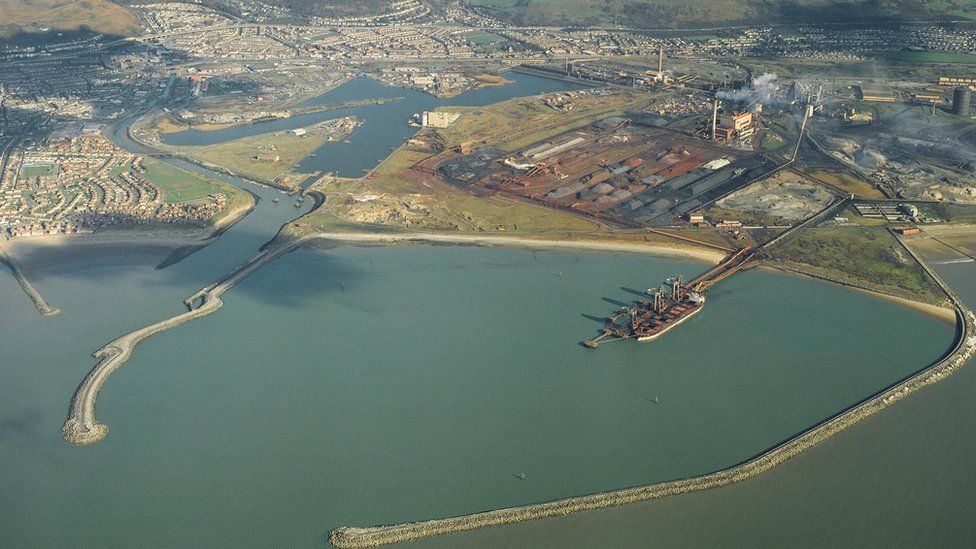What are freeports and will they help the economy?
- Published

Two sites in Wales have been selected to host a freeport.
The Celtic Freeport and Anglesey Freeport are expected to be operational later this year.
Eight freeports have already been set up in England, with a further two soon to be operational in Scotland.
What are freeports?
Freeports aim to create economic activity - like trade, investment and jobs - near shipping ports or airports.
Goods imported into freeports are exempt from taxes, called tariffs, that are normally paid to the UK government.
It means manufacturers in freeports can import raw materials tariff-free, only paying tariffs on finished products leaving the site for elsewhere in the UK.
Or the goods can be re-exported overseas without UK duties being paid.
Companies inside the sites will also be able to claim lower property taxes, including on new buildings they buy.
Firms also benefit from lower rates of national insurance - a tax paid on employees' wages - if they take on new staff.
Where are England's freeports?
Teesside became the first to enter operation, in November 2021.
The Thames freeport in Essex opened the following month.
Sites near Liverpool, Plymouth and Hull have also been set up, as have shared freeports for Felixstowe and Harwich and Southampton and Portsmouth.
The only freeport in England near an airport is by East Midlands Airport in Leicestershire.
The locations were announced at the March 2021 Budget by Rishi Sunak, when he was chancellor, from 18 areas that applied.
What about elsewhere in the UK?
In Scotland, Cromarty Firth and the Forth were chosen from five areas that applied for freeport status.
The SNP-led Scottish government has called the sites "green" freeports, because bids had to include plans for lowering carbon emissions.
However, the SNP's government partners, the Scottish Greens, say there are "no hard requirements" to meet the climate targets. It says that, internationally, freeports are linked to "crime, money laundering, smuggling, and low wages".
The tax and customs benefits available to companies, however, mirror those in place elsewhere in the UK.
In Wales, bids from Celtic Freeport and Anglesey Freeport have been given the green light by the UK and Welsh governments.
The former covers Port Talbot, in the county of Neath Port Talbot, and Milford Haven, in Pembrokeshire, and the latter Holyhead, on Anglesey.
A third Welsh bid, based around Newport and Cardiff Airport, failed.
The Northern Ireland government says it is working with the Treasury to identify whether the freeport model can be adopted under its post-Brexit arrangements.
Are freeports a good idea?
They are not a new idea. The UK set up seven freeports after 1984, including ones at Liverpool and Southampton, but these were phased out in 2012.
However, the UK government argued bringing them back could attract investment to areas that "need it most".
Ministers said they will help with "levelling up" - the goal to close the gap between rich and poor areas that was a key Conservative pledge at the 2019 general election.
But critics argue freeports don't help the economy overall.
The Office for Budgetary Responsibility has predicted tax breaks in England's freeports will cost the UK government £50m a year.
It says historical evidence suggests their "main effect" will be to move economic activity from one place to another.
Will freeports benefit from Brexit?
Freeports are allowed in the European Union - with about 80 sites based in EU countries.
But some Brexit-backing politicians, including Mr Sunak, have previously argued the EU's state aid rules restricted the benefits that can be offered to businesses based inside the sites.
Jonathan Branton, a partner at law firm DWF, says the UK does have more flexibility now it doesn't have to follow EU rules.
He also points out tax breaks offered to freeport firms would no longer require prior agreement from the European Commission.
However, he adds that the Brexit trade deal - agreed by the UK and the EU - still requires subsidies to be justified, otherwise they could be challenged in UK courts.
In more extreme circumstances, the EU could respond to UK subsidies by introducing tariffs on some UK goods deemed to be damaging EU trade or investment.
And the UK will still be subject to World Trade Organization rules - which say you can't introduce subsidies linked just to export performance.
- Published2 August 2019
- Published5 July 2019
- Published29 November 2018